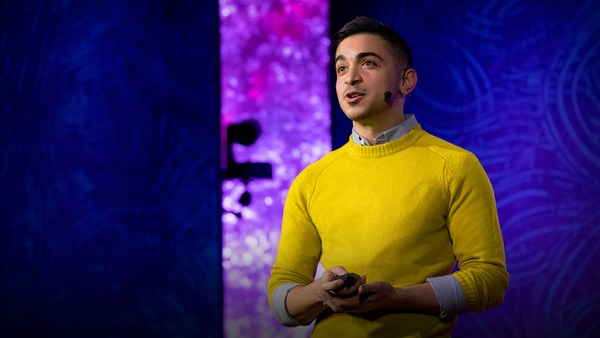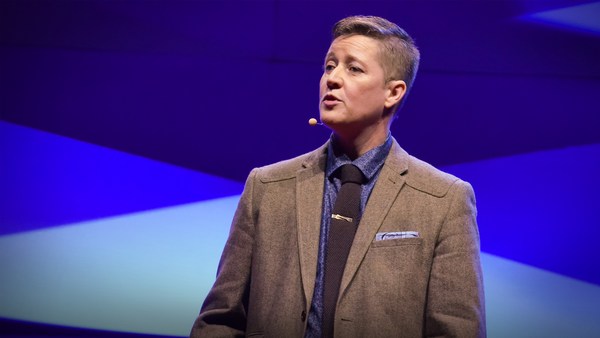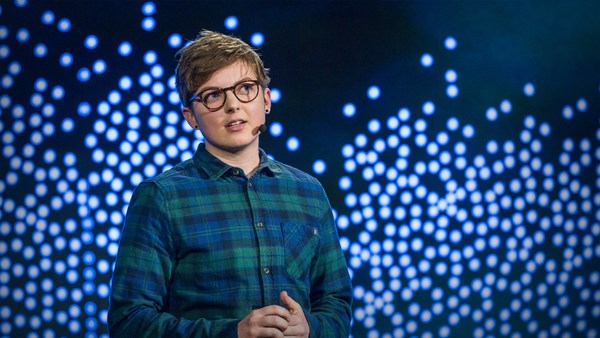For as long as I can remember, I've always recognized myself as a girl. I hung out with all of the other girls, I talked like the other girls, and I had eyes only for makeup, Barbies and girls' toys, all of which could be found in the "pink aisle" at Toys 'R' Us. Before my hair had grown long, I would wear my favorite red turtleneck around my head like Ariel's long flowing hair, and every Halloween, I would tell my parents I wanted to be a girl. A witch one year, and a princess the next year, and another princess the following year, but you know, Disney.
(Laughter)
The point is, I was clearly a girl, but the one thing that I couldn't beg my parents into getting for me was actual girlhood.
Now if you haven't figured it out already, I am transgender, but don't worry, I'm not here to raid your bathrooms and take your women.
(Laughter)
I am here to tell you what it's like to be trans, what it's like to struggle every day with acceptance from yourself and those around you. And of course, that inevitable question of "which bathroom do we put this kid in."
I was born in upstate New York with an identical twin brother 10 minutes behind me, a mother who always did her best to make sure I was happy and a father whose expectations for a son I did not exactly meet. He expected that my brother and I -- Jonas, that's his name -- and before you say anything, yes, I know our names together, Nicole and Jonas, do sound like "Nick Jonas" -- he expected that Jonas and I were each going to get our own baseball gloves, play catch with him and go hunting. In fairness, we did do some of these things. I turned out to hit a better home run than my brother, and I could do it in heels.
(Laughter)
But because of the expectations that my father had, it was harder for him to accept his child as transgender. He wasn't prepared, and he didn't have the information on how to raise a transgender kid. And of course, there was always that question for him, "What do the neighbors think?" So rather than deal with me, he buried himself in hobbies and tried to ignore the flamboyance of his son.
As you can imagine, this left my mother pretty on her own for a while, when my brother and I were little. She's an independent woman, and always tries her best to see the best in people. So when it came to her child's gender, she didn't have a lot of expectations for what me and Jonas were supposed to be like. She didn't care what the neighbors thought. She cared whether or not we were safe around the neighbors. She knew that the world wasn't always going to be an accepting place, so she vowed that at the very least, I was going to have a safe place to come back to in her home.
The only problem with that, though, was that my dad at home didn't get it, so she started trying to educate him. She left some literature lying around for him, but when he didn't show much interest, she did what any other sensible spouse would do. She left the book in the bathroom.
(Laughter)
And lo and behold, when he had run out of other stuff to read in there, there was the book -- “She’s Not There” by Jennifer Boylan. This was the beginning of my dad really trying to come around to me being transgender, and everyone in my family helped, including Jonas, who, at no more than eight, walked up to my dad and said, "Face it. You have a son, and a daughter."
With my family on board, we could start trying to make my transition public. We worked with the school up in Orono, which is where we moved when Jonas and I were five, and we all decided on a gradual transition. What this meant was, I wasn't going to burst into school one day in a full dress, pearls and heels, and let everyone process that. What it meant was that we were going to spread my transition out over the course of elementary school, starting with pink, wearing my hair longer, using the single-stall girls' bathroom, followed in fifth grade by the multistall girls' bathroom, wearing skirts, and finally, using my name, Nicole. What I really liked about the gradual transition was that everyone was cooperating, and it put no strain on the other students, because they were all eased into it with me.
Everything was perfect. Until in fifth grade ... A student who had moved there the year before and wasn't there for our gradual transition told his grandfather about me. And his grandfather was part of a special-interest Christian Right group, and he didn't think that my using the girls' bathroom was OK at all. So logically, the best course of action was to send his grandson in after me. His grandson follows me into the girls' bathroom one day, looks me in the face and says, "My grandpappy says we don't have to have any faggots in our school."
I didn't know it at the time, but that was the beginning of all of my family's hard work coming apart. The school stopped cooperating with us. They pulled me from the girls' bathroom and made me up to be the one who'd done something wrong. After a few months of isolation, I decided to start using the girls' bathroom again of my own accord. But when the grandson caught on, he made another stunt, and again, I found myself in the principal's office, with her giving me a look and saying, "You knew you weren't supposed to go in there." So from then on, through the end of sixth grade, I was to have a bodyguard, who was to follow me at all times, stand 10 feet behind me and make sure that I use the isolation chamber of a bathroom, just because the school was afraid that the grandfather's group would sue. I would get up to go to the bathroom from class, and the teacher would stop me at the door and tell me to wait for whoever was following me that day, in front of everybody. The humiliation was unimaginable.
My family eventually had to leave that school and leave Orono, because the school could not and would not be reasoned with. For the next two years, we had to live in hiding. And live apart, because my father had to stay behind to keep his job. For those next two years in middle school, my parents had to warn me and Jonas never to tell anyone who we were or we would have to move again. So I shut down for those two years. I didn't have any sleepovers, I didn't visit any friends. I was like a ghost. I went to school and I came home.
When the time for high school came, we were approached by a local private school, a place called Waynflete. And ... From my visits there, I learned that they were progressive and forward-thinking. And my brother and I were both accepted. And the best part was, my parents told us that at this new school, we wouldn't have to hide anymore. So at Waynflete, they start each school year off by sending the students on a bonding trip. They do this by dropping the freshmen in the middle of the woods and tell us to "get along." It's charming.
(Laughter) We stayed in yurts.
(Laughter)
But during this trip, I noticed something I was struggling with. I didn't know how to tell these kids who I was. In those two years of being so diligent at keeping my secret, I had actually forgotten how to come out to people. It had been so easy when I was younger -- you know, I would just walk up to somebody and say, "My name's Wyatt. I'm a boy who wants to be a girl. What's your name?"
(Laughter)
But now it was a mystery to me. So I spent that entire trip sitting on my secret, and I just remember how uncomfortable I was when I watched all of my new classmates get in their swimsuits and go down to the lake together.
On the bus ride home, I sat next to a girl named Leah, who I'd grown particularly close to, and about halfway through the ride, she told me that she had a secret. She told me that she was pansexual. Imagine my relief. So ... You know, this was my chance, and I latched onto this kid -- like, I'm serious, I grabbed her and I held her. And I came out to her on that bus, for the first time in two years. And she actually told me ... that it was cool. She asked me a couple of questions, and what she really did was give me a place to talk about myself that I hadn't had in years. And she gave me the confidence to keep coming out to other kids at Waynflete as the weeks went on. And every response that I got was very "yes, and?" The fact that I was transgender was not big news to these kids, and they made me feel like it was the most normal thing in the world. Because it is.
Another strange thing happened while I was at Waynflete. Somewhere during my four years there -- and I don't know when -- I came to be OK with being trans. I could accept myself and my body. I came to feel normal, and I didn’t even realize it. I was able to reach a point where ... You know, I wasn't exactly comfortable with what I had down there, but it wasn't the biggest travesty anymore. And it was people like Leah who gave me the space to do so.
Acceptance at home is fundamental, yes, but ... Frankly, it's just not enough. Trans youth, like most young people, spend the majority of their time in school. And if you spend Monday through Friday, from 8 to 3, being told that you weren't OK, that you are wrong, how are you supposed to think otherwise?
Home and community being accepting together create a space where kids can accept themselves. I was able to do it because the fact that I was trans wasn't being constantly shoved down my throat. And I didn't have to spend every second of every day thinking about it, hiding it and feeling like I was an abnormality. Trans kids, we deal with this two-to-three-year-old concept of gender. Cis kids, your gender is affirmed immediately. But trans kids don't get that. We don't get to focus on what do we want to be when we grow up. I don't even remember. All I remember is that I needed to be a girl. And I couldn't move on until that was affirmed and validated. I was trapped in gender. We're reminded of it on every legal form ever. Passports, licenses, taxes, applications, even bathrooms are separated, male and female.
Now there's a lot of important messages that I could highlight for you all. And trust me, I could go on forever about every little thing that needs to be done in the fight for trans equality, but I'll spare you. What I want you all to leave here today knowing is that you can be Leah. You have the power to make a difference in someone's life. Because you never know when a transgender person is going to come into your life, you need to be prepared and you need to be ready to help them. It might just be some kid at your grandson's school, or it might be your daughter. Either way, you have to be prepared. My father didn't think it had anything to do with him. Guess what? It did.
(Laughter)
If you are on this earth, you are part of the trans story. You need to be ready to be Leah. You have the power to help someone by imagining more than two boxes, male or female. You have the power to create safe environments where whichever box they check isn't the most important part of somebody. You have the power to educate others and yourself. You have the power to bridge those gaps. You have the power.
Thank you.
(Applause)


